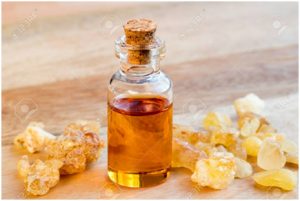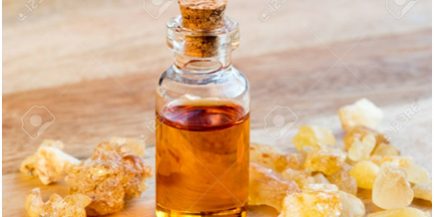Healthline
Written by Alina Petre, MS, RD (CA) on December 19, 2018
5 Benefits and Uses of Frankincense
Frankincense, also known as olibanum, is made from the resin of the Boswellia tree. It typically grows in the dry, mountainous regions of India, Africa and the Middle East.
Frankincense has a woody, spicy smell and can be inhaled, absorbed through the skin, steeped into a tea or taken as a supplement.
Used in Ayurvedic medicine for hundreds of years, frankincense appears to offer certain health benefits, from improved arthritis and digestion to reduced asthma and better oral health. It may even help fight certain types of cancer.
Here are 5 science-backed benefits of frankincense — as well as 7 myths.

- May Reduce Arthritis
- Frankincense has anti-inflammatory effects that may help reduce joint inflammation caused by osteoarthritis and rheumatoid arthritis.
- Researchers believe that frankincense can prevent the release of leukotrienes, which are compounds that can cause inflammationTerpenes and boswellic acids appear to be the strongest anti-inflammatory compounds in frankincense
- Test-tube and animal studies note that boswellic acids may be as effective as non-steroidal anti-inflammatory drugs (NSAIDs) — with fewer negative side effects
- In humans, frankincense extracts may help reduce symptoms of osteoarthritis and rheumatoid arthritis
- In one recent review, frankincense was consistently more effective than a placebo at reducing pain and improving mobility
- In one study, participants given 1 gram per day of frankincense extract for eight weeks reported less joint swelling and pain than those given a placebo. They also had a better range of movement and were able to walk further than those in the placebo group
- In another study, boswellia helped reduce morning stiffness and the amount of medication needed in people with rheumatoid arthritis
- That said, not all studies agree and more research is needed
- May Improve Gut Function
Frankincense’s anti-inflammatory properties may also help your gut function properly.
This resin appears particularly effective at reducing symptoms of Crohn’s disease and ulcerative colitis, two inflammatory gut diseases.
In one small study in people with Crohn’s disease, frankincense extract was as effective as the pharmaceutical drug mesalazine at reducing symptoms (Another study gave people with chronic diarrhea 1,200 mg of boswellia — the tree resin frankincense is made from — or a placebo each day. After six weeks, more participants in the boswellia group had cured their diarrhea compared to those given the placebo .
What’s more, 900–1,050 mg of frankincense daily for six weeks proved as effective as a pharmaceutical in treating chronic ulcerative colitis — and with very few side effects
However, most studies were small or poorly designed. Therefore, more research is needed before strong conclusions can be made.
- Improves Asthma
Traditional medicine has used frankincense to treat bronchitis and asthma for centuries.
Research suggests that its compounds may prevent the production of leukotrienes, which cause your bronchial muscles to constrict in asthma..
In one small study in people with asthma, 70% of participants reported improvements in symptoms, such as shortness of breath and wheezing, after receiving 300 mg of frankincense three times daily for six weeks
Similarly, a daily frankincense dose of 1.4 mg per pound of body weight (3 mg per kg) improved lung capacity and helped reduce asthma attacks in people with chronic asthma
Lastly, when researchers gave people 200 mg of a supplement made from frankincense and the South Asian fruit bael (Aegle marmelos), they found that the supplement was more effective than a placebo at reducing asthma symptoms
- Maintains Oral Health
Frankincense may help prevent bad breath, toothaches, cavities and mouth sores.
The boswellic acids it provides appear to have strong antibacterial properties, which may help prevent and treat oral infections
In one test-tube study, frankincense extract was effective against Aggregatibacter actinomycetemcomitans, a bacteria which causes aggressive gum disease.
In another study, high school students with gingivitis chewed a gum containing either 100 mg of frankincense extract or 200 mg of frankincense powder for two weeks. Both gums were more effective than a placebo at reducing gingivitis
However, more human studies are needed to confirm these results.
- May Fight Certain Cancers
Frankincense may also help fight certain cancers.
The boswellic acids it contains might prevent cancer cells from spreading
A review of test-tube studies notes that boswellic acids may also prevent the formation of DNA in cancerous cells, which could help limit cancer growth
Moreover, some test-tube research shows that frankincense oil may be able to distinguish cancer cells from normal ones, killing only the cancerous ones
So far, test-tube studies suggest that frankincense may fight breast, prostate, pancreatic, skin and colon cancer cells. One small study indicates that it may also help reduce side effects of cancer.
When people getting treated for brain tumors took 4.2 grams of frankincense or a placebo each day, 60% of the frankincense group experienced reduced brain edema — an accumulation of fluid in the brain — compared to 26% of those given the placebo
However, more research in humans is needed.

